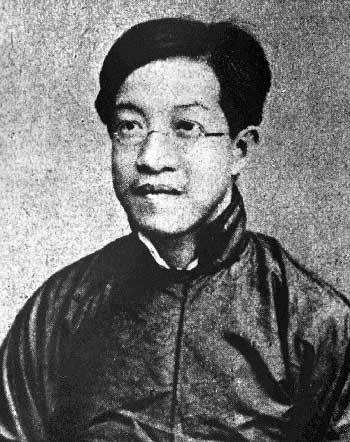Views
Zhāng Tàiyán 章太炎 (1868-1936)
|
| Notable Associates: |
|
Zhāng Tàiyán 章太炎 (1868-1936)
Short bio.
Biography
Zhāng was the scion of a wealthy literati family from Zhèjiāng and growing up he received a classical education. At age 23 he completed his studies under one of the most respected scholars in China,[1] Sūzhōu's Yú Yuè 俞樾 (Courtesy name 字: Qǔyuán 曲園, 1821-1907). In his studies and later scholarly work, Zhāng focused on historical phonology and lexicography.
In 1897 (Guāngxù 光緒 23), Zhāng moved to Shànghǎi 上海 and began writings for the Shíwu bào 時務報, during which time he became acquainted with Liáng Qǐchāo 梁啓超 and Tán Sìtóng 譚嗣同. Along with them, Zhāng became involved in the reform movement led by Kāng Yǒuwéi 康有為, but Zhāng's position became more radical than Kāng’s and he eventually called for the overthrow the Manchu government. This shift in his thought was connected to his embrace of social Darwinism, which was associated with criticism of the ethnic minority Manchu government’s control over China’s majority Han ethnicity. At this point in his life, Zhāng also adopted a materialist position, which was based heavily on the thought of the 3rd century B.C.E. Chinese thinker Xúnzi 荀子. He was also highly critical of both the Christian idea of god and Buddhist reincarnation, which he describes as the belief in a transmigrating soul.
After the failure of the One Hundred Days' Reform in 1898, which resulted in the execution of many including Tán Sìtóng, Zhāng fled to Taiwan, then Japan. In Japan he joined forces with Sun Yat-sen, and led a number of revolutionary activities, such as giving pro-reform lectures to the large number of Chinese students living in Japan.
While in Japan began studying Buddhism under Guì Bóhuá 桂伯華.
In 1903 (Guāngxù 光緒 29), Zhāng returned to Shànghǎi. There he continued his revolutionary activities, writing for local papers and publishing revolutionary tracts. On June 13 of that year, after the "Sū bào Incident 蘇報案" he and a number of other pro-reform agitators were arrested and put in jail. While in prison he began to study Buddhism, particularly Consciousness-Only 唯識thought and Buddhist logic 因明. Although he had studied Buddhism a little bit before this period, this marks his conversion to Buddhism and afterward he became known primarily as a Buddhist scholar. Zhāng eventually rejected materialism (and the evolutionistic ideal of progress) in favor of a worldview based on Consciousness-Only.
By 1918, he had left the world of politics behind to focus completely on Buddhist scholarship.
Important Works
Notable Students
Notes
- ↑ Keenan, Barry C. Imperial China’s Last Academies: Social Change in the Lower Yangzi, 1864-1991. Center for China Studies, China Research Monograph, no. 42. Berkeley: University of California, 1994. Pp. 36-37, 50.
References:
- Chan, Sin-wai. Buddhism in Late Ch’ing Political Thought. Hong Kong: The Chinese University Press, 1985. Pp. 43-46.
- Chang, Hao. Chinese Intellectuals in Crisis: Search for Order and Meaning, 1890-1911. Berkeley: University of California Press, 1897. Pp. 104-145.
- Laitinen, Kauko. Chinese Nationalism in the Late Qing Dynasty: Zhang Binglin as an Anti-Manchu Propagandist. London: Curzon, 1990.
- Táng Zhìjūn 湯志鈞. Zhāng Tàiyán zhuàn 章太炎傳 (Biography of Zhāng Tàiyán). Taipei: Taiwan Commercial Press, 1996.
- Yú Língbō 于凌波, ed. Xiàndài Fójiào rénwù cídiǎn 現代佛教人物辭典 (A Dictionary of Modern Buddhist Persons), 2 vols. Taipei: Foguang, 2004. Pp. 1.1112a-1115a.
